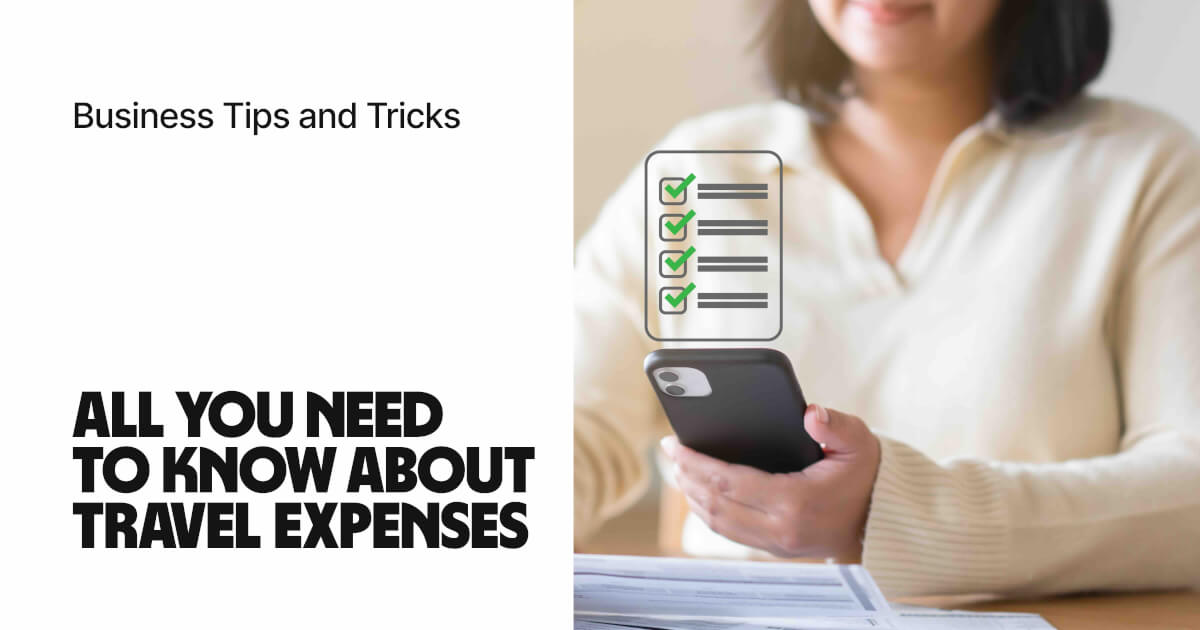Sourcing from China: A Guide to Finding Reliable Suppliers
Discover the secrets to sourcing from China successfully. Learn about finding suppliers, negotiating deals, and ensuring product quality.

As a business grows, expenses like travel expenses start to add up. In fact, expenses like lodging and transportation take up 50% of business travel spending¹.
Managing and keeping track of travel expenses is often a difficult process – the average expense claim takes 20 minutes to process².
This article will look at the best ways to track and manage business travel expenses. It will also talke about how solutions like Wise Business and the Wise Multi-Currency Card for businesses make the process easier and more cost-effective.
Save on your next
business trip with Wise 👍
👉 Make low-cost conversions and transfers
👉 Control your spending with limits and alerts
👉 Move funds between currencies seamlessly
👉 Hold 50+ currencies at once
| Here's an overview of what you need to know👇👇 |
|---|
When it comes to accounting for travel expenses, there are a few different elements that need to be considered. Firstly, many types of travel expenses can be incurred, and it’s essential to provide employees with clear definitions and reimbursement policies to ensure that business expenses are being tracked and processed correctly.
The first step to estimating and calculating business travel expenses is to list potential types of expense that might be incurred. Some might be more relevant than others, but having a list enables you to develop a better plan to track and monitor corporate travel expense accurately.
Transportation expenses include any purchases or expenses that are incurred for or during business travel. Transportation expenses may consist of flights, ground transportation such as taxis or public transport, and gas to get to and from a destination.
For example, if an employee travels on behalf of your business to visit a client in another city, employee travel expenses such as the flight to the city, taxi from the airport to the hotel, and/or costs to get to and from the client office are part of transportation expenses.
However, transportation expenses do not include any charges incurred for normal business operations, such as commuting to and from the office.
| View our full company purchasing card (P-card) guide >> |
|---|
Hotel expenses include employee travel expenses for overnight or longer stays when traveling for business reasons. Hotel expenses should only be incurred when traveling for business reasons and may vary in length, but the business will pay for the cost as the employee is going for business rather than personal reasons.
For example, if an employee needs to visit a supplier for your business located in another city or country, they can expense the hotel stay to your business since they are there on your behalf. You can work with employees to decide the limits for hotel expenses, such as identifying suitable per-night rate amounts that employees can expense or providing a pre-selected list of hotels to choose from.
Traveling can take a significant amount of time, and businesses need to consider how working time is compensated – including overtime or paying travel time expense.
For example, if an employee’s standard working hours are 9-5, but they are asked to take an overnight trip, then employee travel expenses should include the travel time itself – i.e., getting to and from a destination from their home. So if they flew out on Thursday and returned Saturday afternoon, the Saturday afternoon travel time should be considered a business expense and be compensated³.
Business travel reimbursement should also include food expenses incurred. If employees are traveling on behalf of the business, any meals they eat while in transit and during the business trip should be considered a business expense and reimbursed.
So if an employee flew out to another city for your business, the business should cover their food expenses. If you are trying to figure out how best to handle food expenses, you can set a per-day amount that employees should spend based on the average meal cost in the city or advise on a price limit per meal.
When traveling for business, it’s important to ensure employees have the support and resources needed for the trip. In addition, businesses should invest in comprehensive travel insurance to cover instances such as missed flights, lost baggage, delays, and other issues to mitigate risks and impacts on employees.
When mapping out the different types of business travel expenses, it is also crucial to account for other expenses that may come up for employees. Not every trip goes to plan, and it’s important to have some flexibility around corporate travel expense. Other types of expenses might include replacing work equipment (e.g., a laptop charger that stops working, a new charging cable for work phones), supplies, and other reasonable expenses incurred during business travel.
Once you have identified the different types of corporate travel expenses that your business is responsible for, the next step is to set up the tools needed to track and manage expenses. A budget app or a template can help you identify what kinds of limits to set around expenses and reimbursements and how that affects overall business financial health.
Large companies might want to choose a travel platform for their company, such as Travel Perk®, Zoho Expense®, or Spendesk®. However, smaller companies might want to set a budget aside in their account software.
In the end, whether you are a large company or small team, you should organize expenses for your convenience. This process can also be furthered improved with a business debit card.
| There's a new business card in town |
|---|
| The Wise Multi-Currency Card for businesses: After paying a one-off fee, hold money in 50+ currencies, transfer between currencies for a fee from 0.41%, and make monthly withdrawals up to 100 USD at no extra charge. (US cards limited to sole proprietors and single-member LLCs) 👍 |
Once you have a budget app or template, it’s time to set up a travel budget and communicate your business travel reimbursement policy. This means that teams must agree on the planned trip and set up a budget for the business trip before anything is booked to ensure alignment on what can and cannot be reimbursed when traveling for business.
When booking business travel, set up a budget for flights, transportation, and accommodation to help guide the booking process and stay on budget. If a budget and limit are already in place, finding accommodation and planning transportation within those parameters is easier.
To get the best rates, arrange travel at least four weeks in advance, and make sure to check for any clashes or events that could drive rates up. Public holidays and local events around the intended dates will likely mean higher rates since there is more demand, which could skew the travel budget. Also, check for any travel restrictions for destinations before you spend on booking.
As part of accounting for travel expenses, it’s also vital to plan out all parts of the business trip to map out the costs. This includes purchases such as travel insurance and visa or ESTA requirements, as those will impact the travel budget as well, potentially.
| Learn more about the best prepaid small business debit cards >> |
|---|
There are many tools out there to help businesses manage different aspects of corporate travel expense and their impact on the financial health of the business. Let’s look at some necessary tools for end-to-end business travel expense management.
Software like Expensify® can be beneficial for tracking overall business expenses, including corporate travel expenses. In addition, tools like Expensify can automate much of the process around travel expenses and business travel reimbursement, which are crucial for reducing admin time around business travel management.
Many businesses use an overarching expense management software to keep track of all employee expenses, including travel. The software will track and manage all employee and business expenses, including operational and logistical expenses, rather than solely travel.
If business travel is a frequent occurrence for you and/or your employees, having business travel management software can keep everything streamlined and in one place.
You can use travel management software such as Travelperk® to manage all things business travel, including making bookings, managing trips, and providing travel policies as needed for employees.
Accounting software, such as Xero or QuickBooks, is necessary for small and large businesses to ensure you’re getting the complete picture when it comes to overall business financial health. Using accounting software, you can use existing financial data to come up with travel budgets, establish spending limits and manage expenses.
Accounting software can be useful for your business since it can track spending and provide helpful reports that you can use to plan and manage business travel and establish the right budget. Accounting software can also be used to monitor and manage travel expenses for tax reasons, such as when writing off business trips, as you will have a log of all the expenses incurred during business travel.
| Did you know ⁉️ The Wise Business integrates with top accounting software, such as Xero and QuickBooks. Learn how they integrate with Wise 👍 |
|---|
One of the more cumbersome parts of expense management is receipt scanning and tracking. Without the right receipt scanning tools, there is a risk of lost payments, reimbursement issues, and overall expense tracking and management. Employees should be encouraged to keep and send receipts for all expenses incurred to ensure that they are reimbursed in a timely fashion and for faster expense processing.
Expense tools like Expensify and accounting software, such as QuickBooks, have receipt scanner tools, including smartphone apps that can be used to log and send receipts for expense reimbursement and management.
Many businesses have now switched to having employees use a dedicated business card when traveling rather than reimbursing employees for expenses incurred on personal accounts or cards. With a dedicated business card, companies can set limits and parameters for spending and monitor expenses with more oversight.
Plus, having all business travel expenses on one card means that companies can directly manage expenses rather than having to process employee reimbursements, which can save a lot of time in the long run.
Using a business debit card like the Wise Multi-Currency Card for businesses streamlines travel and expense management. Additionally, it also gives companies control and oversight of expense management and tracking.
Businesses should always plan ahead for their travel expenses, but they should also work on saving while traveling. A simple way for sole proprietors and single-member LLCs to do this is by using the Wise Multi-Currency Card for businesses, which can help you save with the competitive mid-market rate.
When customers pay across currency, banks often hit them with hefty fees. These come from purchases made abroad, ATM withdrawals, and online card payments in currencies besides your own.
After paying a one-off fee for your debit card, you will be able to hold money in 50+ currencies, transfer between currencies for a fee from 0.43%, make monthly withdrawals up to 100 USD at no extra charge.
You can also pay a one-off fee for employee expense cards, which allows you to preload funds, set limits, and get alerts to maintain oversight while removing the need for manual tasks. Finally, you won’t have any feeling of panic when given a wad of cash or the only company card.
Manage overseas payments easily
with the Wise Multi-Currency Card
for businesses 👍
Learn more:
The Best Prepaid Debit Cards For Small Business: A Detailed Guide
Company purchasing card (P-card) guide: Which ones are the best?
*Please see terms of use and product availability for your region or visit Wise fees and pricing for the most up to date pricing and fee information.
This publication is provided for general information purposes and does not constitute legal, tax or other professional advice from Wise Payments Limited or its subsidiaries and its affiliates, and it is not intended as a substitute for obtaining advice from a financial advisor or any other professional.
We make no representations, warranties or guarantees, whether expressed or implied, that the content in the publication is accurate, complete or up to date.

Discover the secrets to sourcing from China successfully. Learn about finding suppliers, negotiating deals, and ensuring product quality.

Explore the benefits of manufacturing in Vietnam. Learn about costs, supplier networks, and how to establish a reliable supply chain.

Let's explore the pre-seed funding phase and types of pre-seed investors that will help you get the capital you need for your startup.

Thinking about buying business property in a foreign country? Explore key considerations, legal requirements, and tips for success.

Understand the definition of a business partnership, explore its types, advantages, and disadvantages, as well as how to form a partnership

Learn all about forming a Wyoming LLC, including benefits, formation process, costs, and privacy protections. Discover why Wyoming is a top choice for LLCs